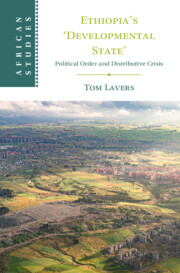Ethiopia’s ‘Developmental State’
Ethiopia stands out as a leading example of state-led development in Africa. Tom Lavers offers in this book a comprehensive, multi-sector analysis of Ethiopia’s development project, examining how regimes maintain power during the extended periods required to bring about economic transformation. Specifically, Lavers explores how the Ethiopian Peoples’ Revolutionary Democratic Front (EPRDF, 1991–2019) sought to maintain political order through economic transformation, and why the party collapsed, leading to the outbreak of civil war in 2020. The book argues that the EPRDF sought to secure mass acquiescence through distribution of land and employment. However, rapid population growth and the limits of industrial policy in the contemporary global economy led to a distributive crisis that was a central factor in the regime’s collapse. This Ethiopian experience raises important questions about the prospects for economic transformation elsewhere on the continent. This text is also available as Open Access on Cambridge Core at doi.org/9781009428316.
Tom Lavers is a Reader in Politics and Development at the University of Manchester. He has been researching and writing on Ethiopian politics since 2005 and has published in leading journals, including African Affairs, World Development and the Journal of Agrarian Change, and two edited volumes.

